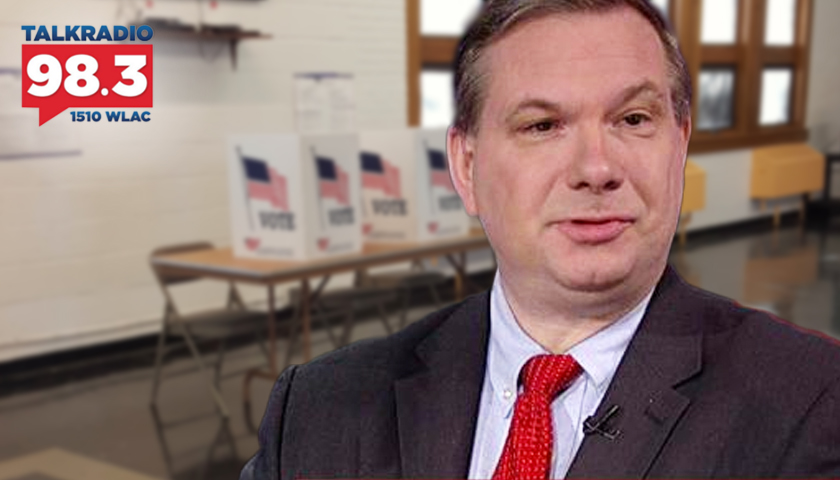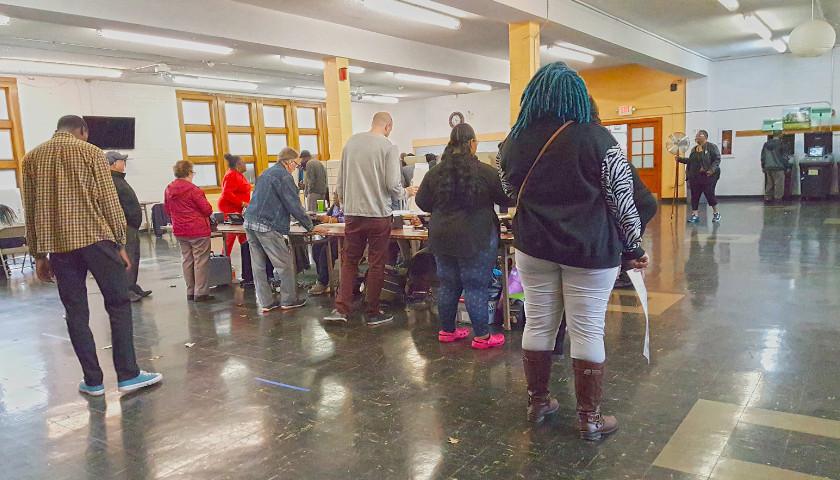Live from Music Row Friday morning on The Tennessee Star Report with Michael Patrick Leahy – broadcast on Nashville’s Talk Radio 98.3 and 1510 WLAC weekdays from 5:00 a.m. to 8:00 a.m. – host Leahy welcomed John Fund, who writes the national affairs column for The National Review, to talk about election integrity and his new book Our Broken Elections: How the Left Changed the Way You Vote.
Leahy: We are joined on our newsmaker line right now by the great John Fund. Our good friend, also formerly with The Wall Street Journal and now with The National Review, author of the book, along with Hans von Spakovsky, Our Broken Elections: How the Left Changed the Way You Vote. John, welcome to The Tennessee Star Report.
Fund: A pleasure, and thanks for all the great stories that you break.
Leahy: John, just for our listeners, I had the delight of having dinner with you and your wife back in September at an event down in Florida. And, boy, what great conversations we had then.
Fund: Election integrity is one of the big issues in 2022, and that’s because I think Democrats are going to pay a price for trying to take away the right of every state to run their own elections.
They basically were after a federal power grab, Nancy Pelosi and Chuck Schumer. And luckily, the American people, including some of your listeners, stopped them.
Leahy: Yes. And so your book is about what happened in the 2020 election. It discusses election fraud that alters election outcomes.
And what I thought was really interesting as you said, all of these problems damage public confidence in the legitimacy of the outcome of elections. Elaborate on that for us, if you would, a little bit, John.
Fund: In 2016, we had the whole Russia, Russia, Russia purported scandal that people used to explain Hillary Clinton’s surprising loss to Donald Trump. And it really took hold with Democratic voters.
Two-thirds of Democrats did not believe that Donald Trump had been legitimately elected president. Two-thirds. In fact, a Democratic congressman challenged the electoral votes of eight states on the floor of Congress after the election.
And Hillary Clinton kept saying that I don’t think I really lost. After 2022, a third of Republicans said they didn’t think that Joe Biden had been legitimately elected and pointed to all kinds of irregularities in various states.
And so we have a situation where the majority of the American people do not believe that the last two presidents took office legitimately.
It can’t be good for democracy. It can’t be good for the legitimacy of a president trying to rally public support behind his policies. It’s corrosive to our system.
Leahy: In your book, you outline some recommendations and solutions to fix the problems of these potential frauds and bureaucratic errors that you document. What are your recommendations and how well are we doing on that here now in 2022?
Fund: Not bad. Nineteen states have moved to pass election reform bills. Many of them roll back the COVID-19 emergency rules that I think led to a lot of the confusion in the 2020 election.
And they’ve also established better rules for mail-in ballots. Look, I’m not against mail-in ballots, but the dessert should not become the main course.
Leahy: That’s a great line, John, by the way. I like that line. It’s a good way to explain it.
Fund: You’ve convinced me to repeat it later. (Leahy laughs) In the case of the mail-in balloting, there was an alternative that a lot of states also offered that was much better. It was called early voting.
So like ten days or two weeks before the election, you allow people to come down to a government office where there are people to supervise the vote account and casting, and they can vote there if they think they’re not going to be in town on Election Day or for some other reason.
Mail-in voting in a mass form leads to all kinds of potential problems. One is you’re giving up your secret ballot. Two is you’re casting your vote often before the final debates are held.
Why do you have a campaign if people don’t actually get a chance to look at the candidates and decide who they want? And they also, of course, are prone to fraud and manipulation, and abuse.
You can coerce or ballot harvest a vote out of someone, and it’s not really a fully valid vote because pressure or manipulation or basically confusion was used in order to collect the ballots.
Leahy: Based upon the changes that have been made, what level of confidence can the American public have in the upcoming 2022 midterm elections and then even further in the 2024 presidential election?
Fund: Well, we need to do a lot more. It would help some states pass voter ID laws. In some states, I don’t think that they have adequate safeguards on that. In New York City a couple of years ago, because they had no voter ID, they sent out a team of state investigators to test the credibility of the election.
And they sent out 63 investigators to vote in the name of people who were dead, who had moved out of state or were in prison. And 61 of the 63 were able to vote successfully, no questions asked.
The only exceptions were a guy who was told, well, you can’t vote at this precinct because you’ve moved. So you have to go down the street to another precinct. And he did that. The only person who was really prevented from voting among these investigators was someone who said, I want to vote.
And the person at the table said, you can’t. And he said, why? And she said, well, you’re trying to vote in the name of my son, and he’s in prison.
Leahy: There’s somebody in studio with us all-star panelist Crom Carmichael. Crom has a question for you.
Carmichael: John, of the 19 states that have changed the law since the last election in Pennsylvania, Wisconsin, Michigan. Are any of those three states among them?
Fund: In those states, we sort of have a log jam because they have Democratic governors and Republican legislatures. So what has to happen is in the 2022 midterm elections, something has to break the tie. And if those states elected Republican governors, then I think the bills that pass the legislature will be signed by the governor and they will become law.
Carmichael: But then what are the rules for the 2022 election in those three states?
Fund: They vary because in most cases, the COVID-19 emergency rules have been suspended. So you don’t necessarily have the flood of absentee or mail-in ballots that you did in 2020.
But most of the existing rules, for example, I think rules that people in Wisconsin found have led to 95 percent voter turnout in nursing homes, which is a red flag and suspicious event. That has not changed. So it’s a mixed bag in each of those states.
– – –
Tune in weekdays from 5:00 – 8:00 a.m. to The Tennessee Star Report with Michael Patrick Leahy on Talk Radio 98.3 FM WLAC 1510. Listen online at iHeart Radio.
Photo “John Fund” by John Fund and photo “voting booths” by Tim Evanson CC BY-SA 2.0.





